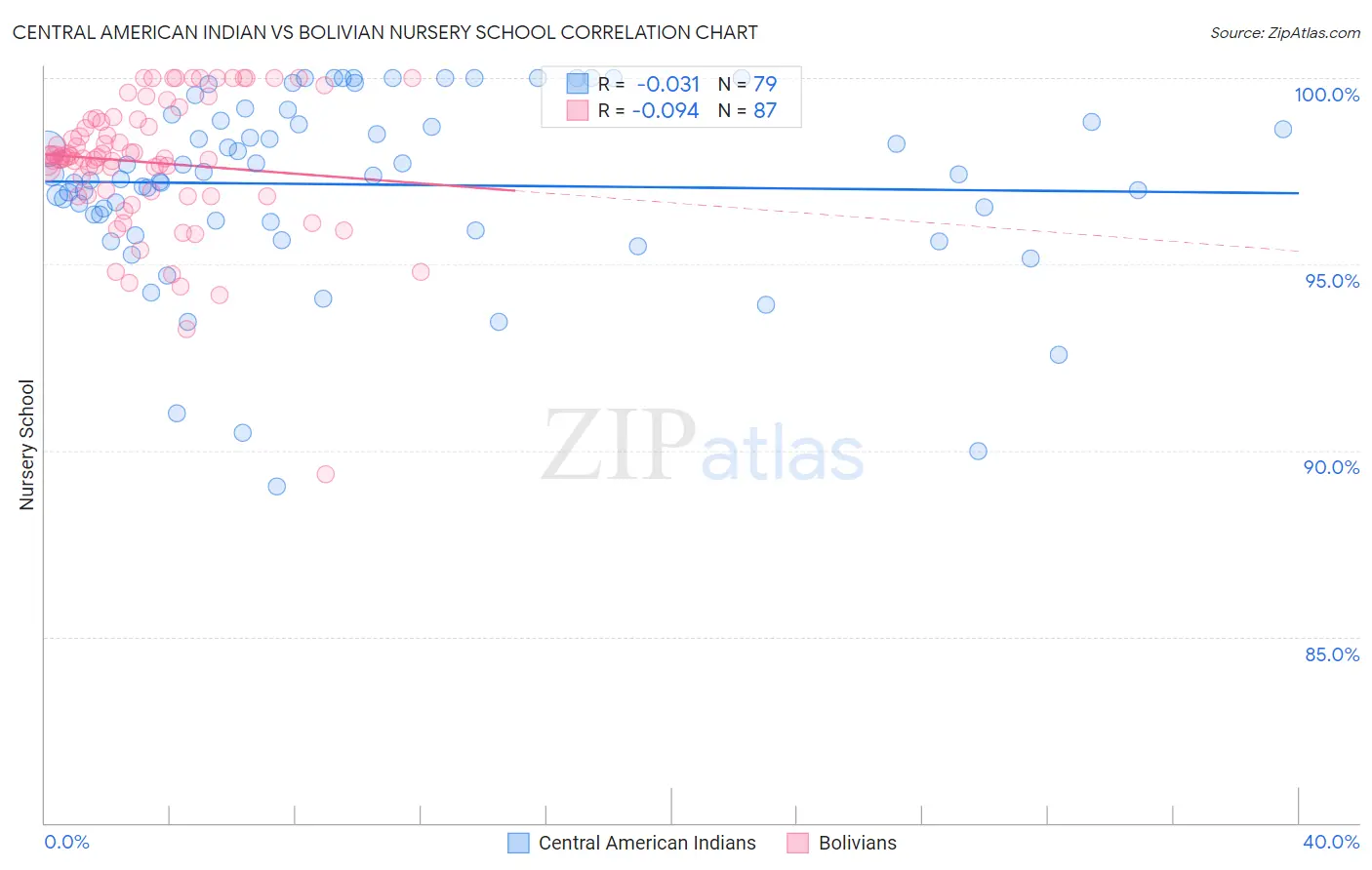Central American Indian vs Bolivian Nursery School
COMPARE
Central American Indian
Bolivian
Nursery School
Nursery School Comparison
Central American Indians
Bolivians
97.2%
NURSERY SCHOOL
0.0/ 100
METRIC RATING
298th/ 347
METRIC RANK
97.6%
NURSERY SCHOOL
1.0/ 100
METRIC RATING
245th/ 347
METRIC RANK
Central American Indian vs Bolivian Nursery School Correlation Chart
The statistical analysis conducted on geographies consisting of 326,141,567 people shows no correlation between the proportion of Central American Indians and percentage of population with at least nursery school education in the United States with a correlation coefficient (R) of -0.031 and weighted average of 97.2%. Similarly, the statistical analysis conducted on geographies consisting of 184,667,361 people shows a slight negative correlation between the proportion of Bolivians and percentage of population with at least nursery school education in the United States with a correlation coefficient (R) of -0.094 and weighted average of 97.6%, a difference of 0.47%.

Nursery School Correlation Summary
| Measurement | Central American Indian | Bolivian |
| Minimum | 89.0% | 89.3% |
| Maximum | 100.0% | 100.0% |
| Range | 11.0% | 10.7% |
| Mean | 97.1% | 97.7% |
| Median | 97.4% | 97.9% |
| Interquartile 25% (IQ1) | 96.2% | 96.9% |
| Interquartile 75% (IQ3) | 98.9% | 98.9% |
| Interquartile Range (IQR) | 2.7% | 2.0% |
| Standard Deviation (Sample) | 2.5% | 1.8% |
| Standard Deviation (Population) | 2.4% | 1.8% |
Similar Demographics by Nursery School
Demographics Similar to Central American Indians by Nursery School
In terms of nursery school, the demographic groups most similar to Central American Indians are Immigrants from Cuba (97.2%, a difference of 0.010%), Immigrants from Dominica (97.2%, a difference of 0.010%), Haitian (97.2%, a difference of 0.020%), Immigrants from Eritrea (97.2%, a difference of 0.050%), and Immigrants from South Eastern Asia (97.1%, a difference of 0.050%).
| Demographics | Rating | Rank | Nursery School |
| British West Indians | 0.0 /100 | #291 | Tragic 97.3% |
| Houma | 0.0 /100 | #292 | Tragic 97.3% |
| Malaysians | 0.0 /100 | #293 | Tragic 97.3% |
| Immigrants | Grenada | 0.0 /100 | #294 | Tragic 97.3% |
| Immigrants | Immigrants | 0.0 /100 | #295 | Tragic 97.2% |
| Immigrants | Eritrea | 0.0 /100 | #296 | Tragic 97.2% |
| Immigrants | Cuba | 0.0 /100 | #297 | Tragic 97.2% |
| Central American Indians | 0.0 /100 | #298 | Tragic 97.2% |
| Immigrants | Dominica | 0.0 /100 | #299 | Tragic 97.2% |
| Haitians | 0.0 /100 | #300 | Tragic 97.2% |
| Immigrants | South Eastern Asia | 0.0 /100 | #301 | Tragic 97.1% |
| Immigrants | Caribbean | 0.0 /100 | #302 | Tragic 97.1% |
| Nicaraguans | 0.0 /100 | #303 | Tragic 97.1% |
| Ecuadorians | 0.0 /100 | #304 | Tragic 97.1% |
| Somalis | 0.0 /100 | #305 | Tragic 97.1% |
Demographics Similar to Bolivians by Nursery School
In terms of nursery school, the demographic groups most similar to Bolivians are Asian (97.6%, a difference of 0.0%), South American (97.6%, a difference of 0.0%), Peruvian (97.6%, a difference of 0.0%), Immigrants from Indonesia (97.7%, a difference of 0.010%), and Liberian (97.7%, a difference of 0.010%).
| Demographics | Rating | Rank | Nursery School |
| Nigerians | 1.7 /100 | #238 | Tragic 97.7% |
| Immigrants | Eastern Asia | 1.6 /100 | #239 | Tragic 97.7% |
| Koreans | 1.4 /100 | #240 | Tragic 97.7% |
| Immigrants | Indonesia | 1.1 /100 | #241 | Tragic 97.7% |
| Liberians | 1.1 /100 | #242 | Tragic 97.7% |
| Asians | 1.1 /100 | #243 | Tragic 97.6% |
| South Americans | 1.0 /100 | #244 | Tragic 97.6% |
| Bolivians | 1.0 /100 | #245 | Tragic 97.6% |
| Peruvians | 1.0 /100 | #246 | Tragic 97.6% |
| Immigrants | Middle Africa | 0.9 /100 | #247 | Tragic 97.6% |
| Indians (Asian) | 0.9 /100 | #248 | Tragic 97.6% |
| Immigrants | Eastern Africa | 0.9 /100 | #249 | Tragic 97.6% |
| Immigrants | Senegal | 0.9 /100 | #250 | Tragic 97.6% |
| Ethiopians | 0.8 /100 | #251 | Tragic 97.6% |
| Immigrants | Africa | 0.8 /100 | #252 | Tragic 97.6% |